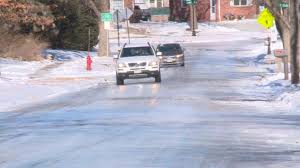
I usually flip through the FM dial on my drive into work in the morning. Last Tuesday, I flipped to Lincoln Top 40 mainstay, KFRX, and heard a delivery driver talk about the hazards he encountered on Lincoln’s icy side streets.
Icy side streets, plagued Lincoln from Air Park to Vintage Heights until last Wednesday. But this hazard can create other kinds of hazards for workers who are forced to navigate slick side streets.
While icy residential streets may seem like a preventable hazard, the law gives cities like Lincoln little incentive to clear side streets.
Hidden hazards of slick streets for delivery drivers
When the roads are bad and weather conditions are cold, most people don’t like leaving the house. With the advent of online shopping and food delivery apps, consumers can order food, shop online, and stay inside.
But someone needs to deliver what is ordered online. Those delivery drivers who bring those goods are at an increased risk of injury and property damage due to icy side streets.
Assuming a delivery driver is an employee, injuries from icy roads incurred in the course and scope of employment should be covered by workers’ compensation.
But many delivery drivers are classified as independent contractors. Most if not all, delivery people, should be employees for the sake of workers’ compensation. But workers don’t always know their rights and often intimidated by employers. As a result, misclassified delivery drivers may end being stuck with the costs of their own work injury.
Third party claims for icy driveways and sidewalks, but not icy streets
If the injury is the fault of someone else, an independent contractor can bring a negligence claim. Even a worker covered by workers’ compensation claim can bring a so-called third-party claim if another party besides them or their employer is at fault for their injury.
But not all negligence related to icy conditions is legally actionable. Yes, a delivery driver can sue a homeowner who doesn’t remove snow for negligence. But thanks to sovereign immunity, it’s difficult if not almost impossible to sue a city for not clearing icy side streets.
Kings don’t need to plow their subjects side streets
Sovereign immunity is a legal fiction borrowed from English law that you can’t sue the king for his wrongs. The Declaration of Independence, George Washington, the Battle of Yorktown and all that other good stuff aside, American governments decided to adopt this British doctrine. (After all, it’s good to be king)
In Nebraska, the Political Subdivisions Tort Claims Act (PSTCA) dictates how and for what conduct political subdivisions can be sued. Political subdivisions, like cities, can’t be sued for decisions made by policy makers. These functions are called discretionary functions. Lincoln Transportation and Utilities Director Tom Casady, a former Lincoln police chief and longtime city hall fixture, used exactly that language in explaining (or excusing) why the City of Lincoln waited until Wednesday to plow side streets.
In addition, just for belt and suspenders to use a legal term, political subdivisions can’t be sued about snow and ice removals on public roads.
Strong-mayor systems and sovereign immunity
Lincoln (and Omaha) are governed under so-called strong mayor systems which means appointed officials within the executive branch are given broad leeway to make policy decisions. This probably gives Lincoln officials another layer of legal protection against litigation over poor street conditions.
Solutions for slick side streets?
A combination of warmer weather, more snow and probably some public outcry lead Lincoln to plow side streets. A more long-term solution for slick side streets in Lincoln could lie with the City Council voting more money for snow and ice removal. The Legislature could also modify the PSTCA to allow cities to be sued over snow removal. Either scenario seems unlikely at present.
Ultimately residents could band together to clear side streets on their own through homeowners and neighborhood associations. I don’t like that option in the long run or big picture because it would tend to favor wealthier neighborhoods and would undermine confidence in government in general and city government in particular.

